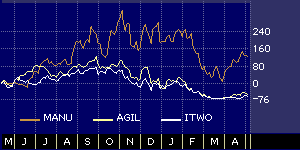
B2B Death Exaggerated
B2B Death Exaggerated
By Hal Plotkin
CNBC.com Silicon Valley Correspondent
May 8, 2001 04:00 PM
Experts say a handful of firms selling private trading network software, such as Manugistics Group Inc. {MANU}, Agile Software Corp. {AGIL} and i2 Technologies Inc. {ITWO}, should find themselves in the business-to-business (B2B) sector’s sweet spot during the next economic upturn.

Manugistics Group, Agile Software and i2 Technologies 52-week stock performance comparison
Like most Internet-related stocks, the B2B sector has been pretty well decimated over the past year. But several leading industry watchers say there are reasons to believe that carefully targeted B2B investments can still pay off over time, unlike investments in the other parts of the dot com economy that have already been all but written off, such as online grocery delivery services.
The B2B sector has often been divided into two groups: firms that emphasize private trading networks and firms that operate public B2B marketplaces, such as Ariba Inc. {ARBA}.
In recent months, however, many software firms, including Ariba, have been moving away from the public B2B marketplace idea in favor of a strategy that is more focused on providing the software and services needed to automate pre-existing private trading networks. (The term private trading network usually refers to the relationships between a single buyer and its suppliers). Firms such as Manugistics, i2, and Agile were focused more squarely on private trading networks right from the start.
“The whole idea of public B2B marketplaces doesn’t add tremendous value,” says Gale Daikoku, senior San Jose-based analyst at Gartner, which advises firms on major technology purchases. “Everyone’s supply chain is different and you don’t get the visibility that is needed all the way through. The technology they are using is immature today. So we expect that private trading networks will be the more important opportunity.”
That’s also the conclusion of a fresh report published by Jupiter Research, which is sponsoring a B2B conference later this month in Boston.
“While public net markets have proven to be an asset for simple transactions, it is clear that companies expect B2B online trading networks to solve larger, more strategic process-related issues,” says Marcia Loewenstein, an analyst at Jupiter, in the recently published study. “Driven by the imperative to accelerate their time to market and reduce costs, businesses have clearly signaled their strong intent to invest in private trading network infrastructure.”
Manugistics, i2 and Agile Software are firms that appear well-positioned to ride out current difficulties because of their early focus on private trading networks, says Tim Clark, senior analyst at Jupiter Research. Clark is a veteran observer of the Silicon Valley scene, having covered it in one capacity or another for most of the last thirty years.
Clark is optimistic about properly positioned B2B firms over the long run. But he adds that investors should expect to see slow and steady progress rather than explosive growth.
“There are going to be continuing difficulties selling software right now,” he says. “Even big companies are finding financing hard to get so they want to conserve and that means putting off major purchases.”
There’s also the long lag time associated with implementing and assessing the impact of B2B private trading networks.
“At first, a lot of people thought this was going to all happen overnight,” says Clark. “But it takes 12 to 24 months to implement these projects. And we’ve been through several changes in the B2B business model in just the last 12 months alone.”
Clark nonetheless sides with the majority of financial analysts following I2, Manugistics, and Agile who remain generally upbeat about those firms. At the moment, the financial analysts surveyed by Zack’s Investment Research prefer Manugistics, Agile Software and I2 technologies, in that order, and by a narrow difference. Manugistics and Agile are rated “moderate buys” according to the consensus analyst estimate, with i2 rated a “hold.”
Although the three B2B companies are very different, they are similar in that all three address practical and proven market opportunities. Manugistics provides supply chain management software that is used by cost-conscious firms such as Wal-Mart Stores Inc. {WMT} and Compaq Computer Corp {CPQ}. Agile Software operates in the higher-margin design end of the supply chain by helping companies automate and manage their product development collaborations with suppliers. And i2 Technologies operates the TradeMatrix service that helps companies bring their suppliers online.
“I think all three will be successful,” says Clark. “It’s a question of how soon and whether some of them might be purchased by other firms.”
Daikoku, of Gartner, says the saving grace of the current slowdown is the fact that companies are feeling less pressure to rush into ill-considered B2B projects.
“Companies have a reprieve to look at what they do well and what they need to improve,” she says. “That’s not a technology problem, it’s a business process problem. But the firms that can help companies solve those problems are in the right place.”
Now, the analysts say, the best of those firms just need to hold on long enough until the right time comes around again.


